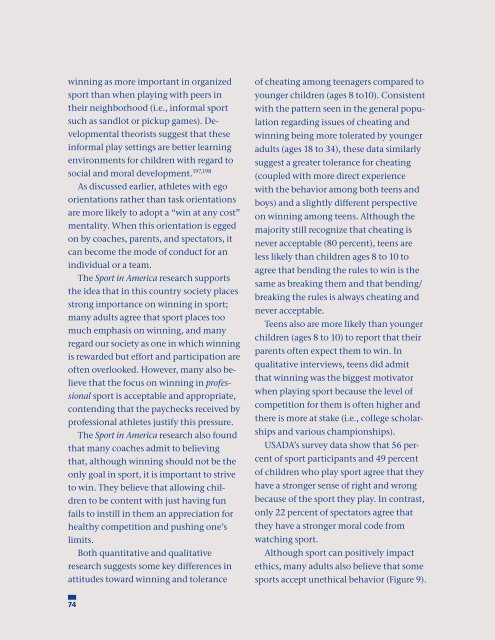True-Sport-Report
You also want an ePaper? Increase the reach of your titles
YUMPU automatically turns print PDFs into web optimized ePapers that Google loves.
winning as more important in organized<br />
sport than when playing with peers in<br />
their neighborhood (i.e., informal sport<br />
such as sandlot or pickup games). Developmental<br />
theorists suggest that these<br />
informal play settings are better learning<br />
environments for children with regard to<br />
social and moral development. 197,198<br />
As discussed earlier, athletes with ego<br />
orientations rather than task orientations<br />
are more likely to adopt a “win at any cost”<br />
mentality. When this orientation is egged<br />
on by coaches, parents, and spectators, it<br />
can become the mode of conduct for an<br />
individual or a team.<br />
The <strong>Sport</strong> in America research supports<br />
the idea that in this country society places<br />
strong importance on winning in sport;<br />
many adults agree that sport places too<br />
much emphasis on winning, and many<br />
regard our society as one in which winning<br />
is rewarded but effort and participation are<br />
often overlooked. However, many also believe<br />
that the focus on winning in professional<br />
sport is acceptable and appropriate,<br />
contending that the paychecks received by<br />
professional athletes justify this pressure.<br />
The <strong>Sport</strong> in America research also found<br />
that many coaches admit to believing<br />
that, although winning should not be the<br />
only goal in sport, it is important to strive<br />
to win. They believe that allowing children<br />
to be content with just having fun<br />
fails to instill in them an appreciation for<br />
healthy competition and pushing one’s<br />
limits.<br />
Both quantitative and qualitative<br />
research suggests some key differences in<br />
attitudes toward winning and tolerance<br />
of cheating among teenagers compared to<br />
younger children (ages 8 to10). Consistent<br />
with the pattern seen in the general population<br />
regarding issues of cheating and<br />
winning being more tolerated by younger<br />
adults (ages 18 to 34), these data similarly<br />
suggest a greater tolerance for cheating<br />
(coupled with more direct experience<br />
with the behavior among both teens and<br />
boys) and a slightly different perspective<br />
on winning among teens. Although the<br />
majority still recognize that cheating is<br />
never acceptable (80 percent), teens are<br />
less likely than children ages 8 to 10 to<br />
agree that bending the rules to win is the<br />
same as breaking them and that bending/<br />
breaking the rules is always cheating and<br />
never acceptable.<br />
Teens also are more likely than younger<br />
children (ages 8 to 10) to report that their<br />
parents often expect them to win. In<br />
qualitative interviews, teens did admit<br />
that winning was the biggest motivator<br />
when playing sport because the level of<br />
competition for them is often higher and<br />
there is more at stake (i.e., college scholarships<br />
and various championships).<br />
USADA’s survey data show that 56 percent<br />
of sport participants and 49 percent<br />
of children who play sport agree that they<br />
have a stronger sense of right and wrong<br />
because of the sport they play. In contrast,<br />
only 22 percent of spectators agree that<br />
they have a stronger moral code from<br />
watching sport.<br />
Although sport can positively impact<br />
ethics, many adults also believe that some<br />
sports accept unethical behavior (Figure 9).<br />
74


